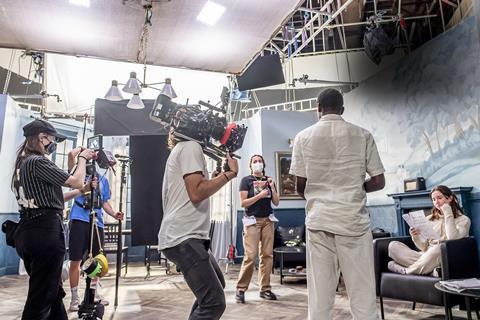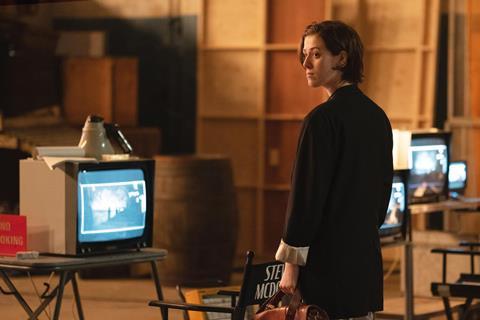As the UK’s production boom continues unabated, the shortage of skilled crew is raising alarm across the industry, and instigating an urgent BFI-led review.

“Tell your friends, we need people working and we need lots of them,” said Ben Roberts, chief executive of the British Film Institute (BFI), at a BFI Film Academy event in September of this year. In issuing this clarion call to the young audience in attendance, Roberts hinted at what many in the UK industry have been warning for a while — that the inward-investment-driven production boom, in particular as the industry comes out the other side of Covid-19, is creating skills shortages that are leaving filmmakers and companies struggling to cope. In the eyes of many, the situation is reaching crisis levels — and even causing panic.
Budgets are rising sharply as competition for technicians reaches fever pitch. Wage inflation is already a factor. Equipment is increasingly hard to find. Projects are being delayed because, as producer Andrea Cornwell — whose credits include The Essex Serpent for See-Saw Films and Apple TV+ and Film4-backed feature Saint Maud — puts it, filmmakers “are not confident they can mount a cast and crew at this time”.
“The problem is massively at the crew level,” she adds. “We are finding that costume supervisors, art directors and prop masters, that kind of senior working crew, are simply not available in the UK at the moment.”

Others talk of the perennial struggle to find competent production accountants. Producer Kevin Loader of Free Range Films tells a cautionary tale about an $8.3m (£6m) independent film he is involved in. “We went through a list of 72 first-assistant directors before we could find one,” he says. “And when you do find one, the rates they are asking are not compatible with £6m independent films.”
In this case, the available candidate was asking for a five-day weekly wage at more than 40% above what was assigned in the budget. Filmmakers are being forced to cut corners and hire less-experienced technicians, or even to do without parts of the crew, in order to balance budgets. Meanwhile, the streamers and studios are offering key workers long-term deals to ensure they are available when needed. This means that even industry stalwarts are facing ferocious competition for crew.
“If someone is being offered a year’s work on a guarantee and we can only offer 12 weeks, they are probably going to take the year,” notes Eric Fellner, co-chair of UK production company Working Title Films. “That’s the way it works. And, yes, the streamers are doing a lot of that, putting people on retainers.”
“It’s tough out there,” says prolific UK producer Damian Jones of DJ Films. “Everyone is in demand. Everyone is working, both in front of and behind the camera.”
Independent productions are being especially hard hit. Loader suggests the “pretty standard” UK feature in the $8m-$14m (£6m-£10m) budget range with actors “who might get nominations” is becoming an endangered species — hard to finance because of a weak pre-sales market and then, even if the money can be raised, “hard to crew up because the rates you can pay on that kind of budget aren’t matching what the streamers and big Hollywood productions are paying”.

Nicky Earnshaw, head of UK production at See-Saw Films, has been overseeing five productions shooting during 2021 in the UK. “We’ve very much been affected by it,” she says of the skills shortages. “The pipeline is basically bursting because anything that was meant to go into production in 2020 didn’t… This year it feels like we’ve got double the amount [being made].”
Earnshaw cites some of the challenges See-Saw has faced. On one production, the company had to bring in lighting equipment from Belgium because nothing was available on home soil. On another project backed by a streamer, the original plan was to have a second unit in place.
“We haven’t been able to find the crew to do that so we’ve had to extend the main schedule — which obviously has a huge cost implication,” says Earnshaw, who also cites a shortage of rental trucks for transporting props and, like other producers, of crews “leaving projects early and jumping around a lot more” as demand for their services rises. “The additional impact on everyone this year is that we’re still dealing with the fallout from the pandemic,” she adds.
Covid-19 testing remains rigorous and most producers are following the protocols very strictly. They know that if they do so, there is less chance they will have to close down sets because of a single positive test.
In the meantime, urgent calls are being made on every side for new recruits. In 2017, when the BFI launched its Future Film Skills Action Plan, it was calculated that more than 10,000 new entrants to the industry were needed by 2020 to plug the skills gaps. “We were charged with finding 10,000 new recruits and getting them work-ready, and upskilling 15,000 of [the] existing workforce,” says Gareth Ellis-Unwin, head of film and animation at industry-led skills body ScreenSkills. “We’ve met and exceeded those targets.”
Now, though, the demand has shot up exponentially. “There are hundreds of roles and thousands of people required,” says Adrian Wootton, chief executive of Film London and the British Film Commission.
“It is an incredibly competitive market,” agrees Candice Campos, vice president of physical production at Disney-owned Lucasfilm, of the pressure on crews. Lucasfilm is already heavily involved in the Future Film Skills trainee programme designed to tackle the lack of diversity in the sector. Since 2017, many new recruits have been brought into the industry through the programme, working on Star Wars and Marvel films shot in the UK. In 2021 alone, 53 trainees have been placed on Lucasfilm productions in the UK, among them Indiana Jones 5, Willow and Andor.
“We have not run into an issue of shortage [of crews] but we definitely see that if we don’t get ahead of this and we don’t continue these programmes — and not just dribs and drabs but big strides — there will be a lot of shortfalls in the future,” Campos warns. “Not only us but all the other studios are growing by leaps and bounds.”
Opening up the industry

The skills shortage crisis has made broadening the demographic base of the UK film and TV workforce not just an aspiration but a necessity. “There is a genuine opportunity to now open up the industry,” says Neil Peplow, director of industry and international affairs at the BFI. He sees the chance to create a fully diverse workforce in UK film and TV, which historically has been regarded as a closed shop.
“The society we step into every day should be represented on our film and television sets,” Campos adds, echoing remarks regularly made by Lucasfilm president Kathleen Kennedy about the emphasis on opening up the industry for people of all backgrounds.
Others are equally optimistic the UK industry can become far more inclusive than it has ever been before. The danger now, though, is searching for knee-jerk, short-term solutions.
“I am a fierce advocate for it to be a collegiate approach,” says Ellis-Unwin. “If we try to deal with this by fragmenting training and doing lots of pop-up boutique solutions, we’re going to miss the opportunity to create a sustainable talent delivery pipeline, which we’ve never really had. We can now make a commercial argument to government that this needs proper investment. It’s an area we’ve been under-investing in for many years.”
In late June, the BFI announced a major strategic skills review on behalf of the Department for Digital, Culture, Media and Sport. This is being conducted with ScreenSkills, national and regional screen agencies, trade bodies, unions and leading industry figures. “We hope to have something we can present before the end of January, it’s a really quick turnaround, and then what comes out of the review has to be action-focused,” Peplow says of the accelerated timetable.
While waiting for the new long-term plan to be put in place, industry leaders are showing ingenuity in addressing the skills shortages they face right now. Andrew M Smith, chair of Buckinghamshire Local Enterprise Partnership and corporate affairs director at Pinewood Studios, is involved in an initiative to bring former aviation industry employees at Heathrow Airport into the film industry. “During Covid, the airline industry was devastated so it was a no-brainer,” says Smith of the joint programme by Pinewood, ScreenSkills and the Department for Work and Pensions to retrain the airline workers. “We had a sector that was falling, and one that was thriving.”

This follows on from the ScreenSkills Grips For Heroes programme originated by Ellis-Unwin and aimed at ex-military personnel. “I had been filming in Jordan and it struck me that someone who could keep a tank running in the desert could probably service a dolly or a crane,” he says.
There has also been a concerted effort to pull in accountants, electricians and anyone else with transferable skills into film and TV production. Kitchen staff whose restaurants closed during the pandemic lockdowns have retrained as film technicians; event co-ordinators and sound engineers from the music world have been drafted in, as have security staff.

Andrew Reid, head of production at Northern Ireland Screen, talks about targeting recruits from the live-entertainment industry and the building trade to service two huge productions, Hasbro/eOne and Paramount’s Dungeons & Dragons and Netflix’s The School For Good And Evil, which were both shooting in Northern Ireland at the same time.
Screen Alliance Wales launched its Step Across programme earlier this spring, looking to recruit workers in the theatre and live-events sector whose livelihoods had been affected by Covid-19. Isabel Davis, executive director at Screen Scotland, highlights the work done through Scotland’s National Transitional Training Fund during the pandemic to bring theatre workers into the film and TV sector. Many have gone on to be employed on projects including a pair of Amazon TV series, The Rig and the second series of Good Omens (the latter has just begun its Scottish shoot).
Plenty of training initiatives were already in place even pre-Covid and before the recent production boom. Northern Ireland Screen has been investing heavily in skills for the last decade, directly employing 80-120 new trainees every year. Through schemes such as the Film London Equal Access Network (EAN), hundreds of young people from diverse communities in the southeast are being given work placements — and most are then landing permanent paid jobs in production.
Filmmaker Steven Knight’s new Birmingham-based studio Mercian Studios is committed to training new recruits from the West Midlands in order to boost the crew base there.
Working Title was involved in the launch of the London Screen Academy, the state-funded sixth-form academy in Islington, which was launched in 2019. “We’ve only got one year of graduates so far and around 80 have got placements [in industry jobs],” says Fellner. “We have four at Working Title and they are just brilliant. The energy they bring to everyday life is fantastic.”
The school has an intake of 300-400 students a year. “That’s not enough,” continues Fellner, floating the possibility that further screen academies might open elsewhere in the UK. “That is something for the future. We need to make sure the London Screen Academy is the best academy of its kind anywhere in the world. Once we’ve done that, we will be looking at opportunities to grow.”
ScreenSkills joined Warner Bros and Netflix last year in a scheme to enable more young people coming into the industry to benefit from the apprenticeship levy, which has been hard to use in film and TV because of the freelance and short-term nature of much of the employment.
While the UK film and TV production industry continues to go through one of the biggest growth spurts in its history, the growing pains are causing significant issues. Career development has been accelerated at what some say is a reckless and unsustainable speed. “People are being promoted into positions in which they have absolutely none of the skills or experience [needed] to do them,” says Crispin Buxton, whose Raynham Hangar Studios in Norfolk hosted Michael Winterbottom’s This Sceptred Isle and Joanna Hogg’s The Souvenir films (with Buxton as associate producer). “I know of chaos on productions; I know of people who were junior production co-ordinators a year ago who are [now] production managing multi-million-dollar projects.”
Inflationary factors

The Souvenir cost $3.9m (£2.8m) and its follow-up cost $4.7m (£3.4m) to make. “If we were trying to put that together now, we couldn’t do it for that money,” Buxton says of the inflation creeping into the industry. “This distortion of wages conflates with the inexperience. You have people who have been in the business for a nanosecond who are demanding outrageous rates. The streamers with their dollars have completely distorted the cost of labour. This distortion of wages and the power that is suddenly vested in crew, experienced and inexperienced, is worrying.”
Freelance screen workers have rarely, if ever, been so heavily in demand. There are stories of unqualified school leavers being paid hundreds of pounds a day as Covid supervisors and of independent productions having to reschedule because of the non-availability of a dolly grip — a technician who, in less heated times, could almost be taken for granted. The arrival in the UK of massive new productions including Amazon’s The Lord Of The Rings TV series might exacerbate further the problem.
On the flip side, others suggest the streamers and US studios are “pouring money into training” — for example, Netflix’s new Grow Creative programme to train up to 1,000 people in the UK — and point to the increased opportunity and employment created by their presence. “The question when you’re looking at skills is how do you make somebody credible quickly. You can give people training, give them the skills but how do they get the knowledge, how do they get the experience,” says Northern Ireland Screen’s Reid, pinpointing a problem many others have also identified. “Even with the best skills training available, you can’t compensate for the expertise that comes from serving long apprenticeships, learning on the job.”
Fellner counters the industry “self-filters” and that anyone who cannot do their job will be found out quickly. “The upside is that young film students, graduates without a lot of experience, are going to be given opportunity,” says the Working Title co-chair. “You could find yourself with a $1m-$3m movie getting made with a cinematographer straight out of Beaconsfield [the National Film and Television School]. They may do an incredible job and then, boom, in one movie they’re straight into being a sought-after cinematographer.”
Another challenge is to convince newcomers the UK screen industries are an attractive place to work. Stories of harassment and exploitative working hours do not help. The Film and TV Charity last year reported 87% of those working in the sector have experienced a mental health problem. “If we constantly have negative headlines about the culture of working in the screen industry, it will be difficult to encourage young people or people who have the skills that we require,” notes Reid.
When inexperienced crew members are promoted too quickly, it can create stress for themselves and those around them. Graham Beswick, CEO of extras casting agency Mad Dog 2020, talks of tensions caused by a shortage of experienced second-assistant directors (responsible for “crowd”), with untrained candidates being parachuted into the role. “They don’t know what a second-AD does,” he says. “That affects us at Mad Dog Casting because we end up having clients who are very stressed, and they take that stress out on us.”
Beswick also suggests that promoting underqualified crew members too quickly risks “perpetuating bullying and harassment”. Mad Dog is therefore pushing new training programmes for assistant directors, for example the Production Guild scheme The Extra Factor: Supporting Artists — Liability and Best Practice, which Mad Dog has funded.
Retaining talented crew

The industry is also struggling to hold on to the skilled workers it already has. “If we are looking at this as a pipeline, where is that pipeline leaking? There are people leaving the business. That needs a good hard look,” says Screen Scotland’s Isabel Davis. “We can’t afford to be losing people. Retention is a big part of this.”
She and her colleagues in Scotland are exploring ways to make the sector more appealing in terms of working hours and possible job sharing. “Anecdotally, we are hearing people are leaving [the business] perhaps if they are young parents, or if they are carers, or if they live outside the central belt.”
In the short term, there is no obvious solution to the skills shortage beyond doing what some observers call “triage”. Bringing in workers with transferable skills and speeding up training programmes will not, on its own, solve the skills shortage problem overnight.
“There is a certain benefit to flying hours. You do learn on the job,” says Loader. “You know what the average indie film production team is like — it is stretched. It’s pretty efficient but there’s not much slack, and you need some slack to really train people on the job. The goodwill is there, [but] the actual time and spare capacity for experienced people to train inexperienced people on a lower-budget production is very difficult to manage.”

“It is hard to give any advice that doesn’t sound like you’re patronising [the producers],” says Kaye Elliott, director of high-end TV at ScreenSkills, of the situation facing producers who cannot find the crews they need. “It is a challenging moment right now. You can draw comparisons with lots of areas in other industries where there is a shortage of people and it has a knock-on effect. You can’t leapfrog into that future. The pain is now and unfortunately I don’t think there is a way around it.”
One alarmist forecast suggested that by 2025 the UK will potentially be 60,000 people short of the necessary numbers needed to crew up inward-investment productions once the rapid expansions of Shepperton and Pinewood are completed and other new studio spaces are opened. That figure, though, ignores the work already being done to address the problem. Similarly bleak predictions were made about the UK’s “capacity crunch” a few years ago when it was feared the studios and streamers would head elsewhere if they could not find anywhere to shoot. Those fears have been allayed by the huge expansion in studio space.
A sense of perspective is therefore required when contemplating the current skills shortage. “This is a global problem,” Reid points out. “If the industry is to grow and we are to create greater capacity, then we have to have these moments where we stretch. They are uncomfortable — we are clearly having a stretch year when we know we are beyond capacity. We have to take it as an opportunity to strengthen, and look at ways of drawing talented people into the industry who may not have been attracted before.”
ScreenSkills’ Elliott, like many in the industry, points to “the fantastic opportunity” now being given to the UK’s film and TV sector, and to those who want to work in it. The chances “to enter a dynamic industry have never been higher”, she says.
“This unprecedented production boom is a good thing,” adds Ellis-Unwin, noting the pain the industry’s freelance workforce felt during lockdown. “It is good for the economy, it’s good for our industry and it’s good for those that, for many years, have not seen any pay escalation and have very recently come through a period of six to nine months of not working.”

Now, then, is a time for gritting teeth and meeting the challenge. As Davis notes of the current pressure on crews, “It’s a high-quality problem. It’s a problem everyone would like to have.”
Veterans such as DJ Films’ Damian Jones note the irony in the situation. “It was hard enough when there was no money around and plenty of crews. Now, there’s money around and no crews,” he says, adding tongue in cheek: “The only people who are not in demand and having salary increases are us producers.”






![The Brightest SunScreen[Courtesy HKIFF]](https://d1nslcd7m2225b.cloudfront.net/Pictures/274x183/3/5/0/1448350_thebrightestsunscreencourtesyhkiff_312678.jpg)


















1 Readers' comment